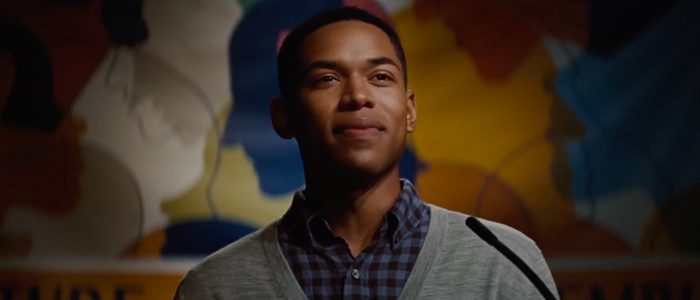Luce Brings Light to the Age of Anxiety
There is so much to complain about these days, even if you forget about presidential politics. Read enough news and you would think everything has gone wrong. It’s the same with movies that play on our deepest contemporary anxieties.
A fantastic corrective is “Luce,” which might never achieve popular acclaim but more than any movie in memory, this film highlights just how many of these issues are either fake or invented on our own simply to cover up for a problem that we all want to avoid: human beings are flawed creatures who make mistakes. All of us.
The film’s core thesis makes you believe that it will grapple with the huge issue of race and racism. A successful and white middle class married couple adopted a black child from some war-torn region at the age of 7. They changed his name, got him into therapy, sent him to the finest schools, and there he is today as a senior in high school. He is a sports star. His grades are perfect. He will be valedictorian. He is well-spoken beyond description. He is everyone’s hero. And what a credit to his socially conscious parents!
But there is a conflict roiling under it all. What is it? We assume every cliche. He has lost touch with his racial identity. He is confused about his past and wonders about his blackness and its meaning. He begins to puzzle about why he was raised as a white person. Surely the film will deal with all this and this kid will deal with the pain of a loss of identity and the regaining of one he was denied.
Right? Just as soon as you think you have the thesis, it gets confusing. Luce and his parents have a warming and loving relationship. The school is mixed race and he is hardly alone. The teacher with whom he has developed a conflict is herself black. She seems to pick on the black students in particular, so perhaps we are dealing with an investigation into self-hatred. As soon as that thesis comes into mind, it too is zapped away because it doesn’t seem to be a persistent pattern.
The difficulties at school began when Luce wrote an essay in class in which he was told to assume a persona from history. He chose a black revolutionary leader who extolled the necessity of violence. He wrote a compelling story but it worried his teacher, who brings in his parents to warn that Luce might have underlying psychological problems, perhaps he is having violent fantasies, and probably ought to be on a watch list.
The film pivots again: maybe it is going to be about the problem of safety in schools and our paranoia that one of the students could turn into a monster and shoot the place up. Any sign of eccentricity triggers the authorities to act. This ends up having a smothering effect on the student’s creativity. That too sounds like a great thesis!
But there’s a wrinkle. You begin to notice that everyone in his film has an obsession with their smartphones and social media. Every minute or so someone is checking, texting, swiping, sneaking looks, pawing their phones, sleeping with them, and so on, and this is true for teachers, students, administrators, and everyone else. And the interactions on social media create every manner of pathology among everyone, manufacturing and feeding perverse obsessions and conflicts for no reason.
The film might, then, be about the problem of cell phone abuse, and perhaps the pathologies of technology in general, but then you notice something else. It seems like all the adults never stop drinking. They drink to celebrate, drink to calm down, drink to make the pain go away, drink to bury their problems. The kids too have drinking problems not to mention the usual issue today of pot and parties. So here we have yet another social pathology under exploration. Oh now let’s add to that hints of sexual abuse among the students, and a claim being rumored that one of the students was raped at a drunken party.
What else? Oh, there is also the issue of mental illness. It turns out that the teacher has a sister afflicted with some sort of schizophrenia that sends her into panic meltdowns from time to time so she has to be periodically institutionalized. Other possible core issues include the insane pressure that we put on high school kids to be amazing to set them up for good careers. Or maybe it is a simmering marital conflict that comes with two working parents and their different political outlooks.
Finally, there’s the high social cost of success. With Luces’s amazing story of redemption, he is faced with the cripple of envy from his fellow students. His parents want him to be the perfect son, his teacher wants him to be the perfect student, his principal wants him to be iconic for the school. While these are all well within reach for Luce, it’s a problem that his future is protected while the future of his friends is disposable.
In particular, the other black students are viewed as lesser than Luce. He is often characterized in the movie as being the future Obama. This speaks to his ability to appeal and be accepted by a dominant white suburban culture that his teacher argues is necessary for black achievement, but at the high cost of exile from his black friends. His adolescent optimism is later shattered in yet another bomb-dropping revelation that exposes his own contribution to the systemic devaluation of other black students who are not embraced by the people and institutions seemingly responsible for Luce’s bright future. Again, this line of thinking adds to the knottiness of complex realism.
What you gradually come to realize in this film is that the viewer’s search for a dominant meaningful message here is mostly hopeless. All the problems mentioned above are real and play a role. But not one stands out as decisive. The viewer gradually comes to realize that all the pain, difficulties, and seething conflicts throughout this small society of parents and students are an extension of something we don’t want to think about, which is that the world is not made up of saints and witches but rather normal people who excel in some areas, make mistakes in others, do good things and bad things, have both sweet and evil motivations. This is true for everyone in the film, and yet something about our current obsession with finding the one culprit behind social problems distracts us from this basic truth.
The slow dawn of this reality makes for a spellbinding drama that is enormously satisfying in the end. The takeaway is thrillingly mundane and just uncertain enough to keep you talking about this until late in the evening.
There are so many troubles in the world. Racism, deracination, immigration and assimilation, alcoholism, drug abuse, sex abuse, techno-anxieties, over-policing of institutions, too much pressure on students, and marital conflicts. The list is potentially endless. But the search for the problem and fix to make the world a perfect place – an ambition that consumes our public culture today – is ultimately futile. The world is a flawed place because people are flawed. It’s a simple and yet revealing observation that somehow shocks us to discover.
The film Luce is beautiful, haunting, and profound precisely because it doesn’t take the easy path. It doesn’t disguise the underlying truth that our endless search for saints to canonize and witches to burn is nothing but a cover for our failure to deal with the much less dramatic troubles in our own lives.













